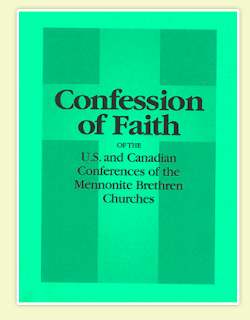Delegates to the March 3-4 convention of the Mennonite Brethren Church of Manitoba (MBCM) will vote on whether to remove Jubilee Mennonite Church from membership.
Prior to this vote, River East Church invited MBCM to consider its Borderland Proposal to interrupt the process to suspend and remove churches that want to welcome and affirm LGBTQ+ people in order to provide more time and space for further conversation.
The Proposal was sent to MBCM in January. River East has not received a response.
Borderland Congregations Proposal for MBCM Board
Overview
River East Church is proposing a 5-7 year period in which churches such as REC could remain part of MBCM and yet pursue understandings and practices that may border on the edges of common interpretations of the Confession of Faith.
River East feels led by the Holy Spirit to cultivate an inclusive community that would create space for a number of marginalized and underrepresented groups/persons in the MB community.
We have expressed our desire to pursue radical inclusion in a statement that includes many categories, but the one which we feel we need leeway to explore is that of full participation of LGBT persons. This may include marriage and church leadership.
Perhaps, not unlike Philip in Acts 8, we are being called to leave the center (Jerusalem) and move to the edges (a wilderness road).
Our view
We would like to remain a part of MBCM and we believe the Board would wish REC to remain a part of the conference. We hear the teaching of Christ encouraging REC to be more expansive by making space for same-sex marriage, but we are not at this point suggesting a change in the Confession of Faith or in the traditional interpretation of Scripture held by others.
Instead, we are
requesting that the MBCM Board grant permission to REC, and any others that
would like to join us, in a flexible posture of 5-7 years where LGBTQ+ members
would be invited into full participation which may include leadership and/or a
life of committed marriage.
REC has seriously considered scripture, tradition, reason, and experience in coming to our inclusivity understanding. We believe we follow in the path of Jesus who was the welcoming Presence of God. We understand the Biblical trajectory as moving over time and experience from Law to Grace, exclusion to inclusion, punishment to mercy.
We have no desire to judge others, but we cannot deny the movement of the Spirit among us, leading us into a more generous posture of inclusion of any person eager to be on a path of following Jesus and loving the God who loves us all.
We understand that the Confession of Faith changes from time to time as noted in #4 of the Nature and Function of the Confession. This process of community hermeneutics is partly explained in item #3.
River East would like some time to work on this position as we have learned so much more about what it means to be LGBTQ+ and what those persons have to offer a congregation.
Also, in #6 in the Nature and Function of the Confession, it states that “the Board of Faith and Life also recognized that there may be times when leaders embrace a ‘principled confessional integrity’ rather than a ‘legalistic confessional rigidity.’”
In other words, struggles with particular statements in the confession are not incompatible with affirming the confession in principle.
Process
1. Borderland Congregations could be defined as: A respectful acknowledgment that there are those in the MBCM family of Christ (congregations and individuals) whose careful study of scripture and prayerful journey of discernment has led them to a different understanding. An example would be covenanted same-sex relationships differing from a commonly understood stance of reading Articles 10 and 11 in our Confession of Faith.
2. MBCM Board would consider and approve the concept of a ‘Borderland Congregations’ framework.
3.
REC
requests that the MBCM board regard this negotiation as a matter of governance
appropriate for the MBMC board and not, at this point, a matter requiring a
vote of the MBCM assembly.
4.
A
time period of 5-7 years be allotted for this initiative during which churches
would maintain an active conversation with the Board and PFLT.
5.
At
the end of the specified time there would be a complete evaluation of how the
inclusion process is working in both Borderland and non-Borderland
congregations as both seek to live out our mission for the world. At this point
changes to the CoF could be suggested or the Borderland Congregation be asked
to change or leave.
6.
REC
may reach out to other congregations who are having similar conversations.
7.
MBCM
could invite ONMB to participate as well.
8. River East would remain in relationship with MBCM and its congregations, seeking to learn from one another.
Conclusion
What we ask of conference leadership is this: That we be allowed to stay within the Mennonite Brethren church family in Canada as member churches that seek to faithfully interpret scripture, acknowledging the theological differences among us. We believe that this is a reasonable request.
While several MB-affiliated churches in Canada are, by their stated positions and actions, challenging Article 11 (Marriage, Singleness, Family) and by extension Article 10, of the Confession of Faith, there are other MB affiliated churches in Canada that by their positions, actions, or inactions, have challenged other articles of the Confession yet remain in good standing in the conference.
For some MB-affiliated churches, Article 13 (Love and Nonresistance) is treated as an historical peculiarity of the Mennonite Brethren rather than a core conviction. For some MB-affiliated churches, a significant component of Article 3 (Creation and Humanity) is expressly ignored or countered in church policy in terms of women in leadership.
As the MB Conference already occupies diverse theological space, we ask that room be given to churches whose practices are on the borderland of the Confession of Faith.












